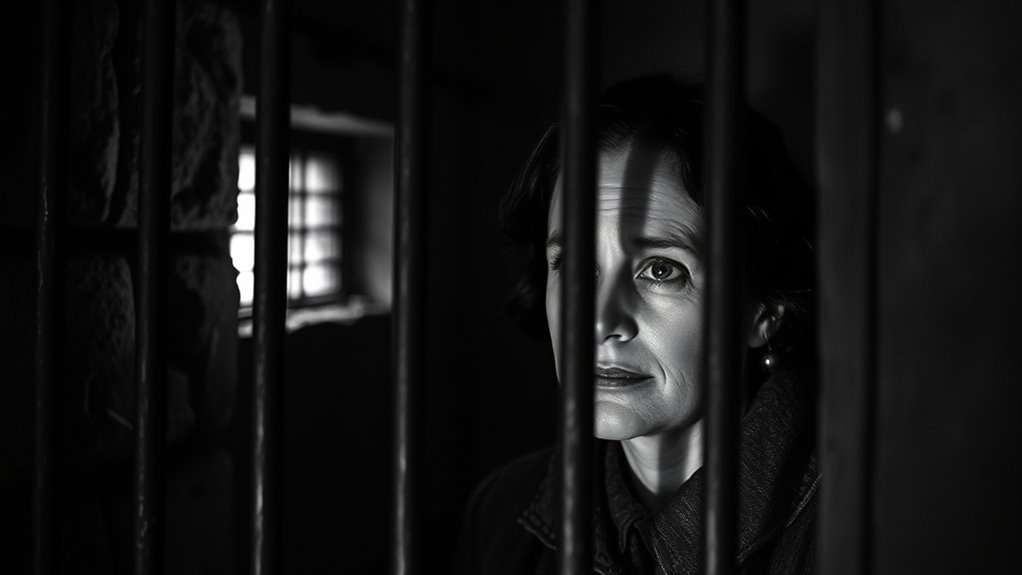In Corrie Ten Boom’s story, you see how a family’s deep faith and courage helped them hide Jews during Nazi persecution, risking everything. Despite her arrest and harsh imprisonment, Corrie’s unwavering hope and spiritual strength shone through her suffering. Her ability to forgive her enemies after experiencing unimaginable cruelty highlights the power of mercy and hope in even the darkest times. To discover how her journey of forgiveness transformed her life and inspired others, keep exploring her incredible story.
Key Takeaways
- Corrie Ten Boom’s unwavering faith provided strength during her imprisonment and persecution under the Nazis.
- Her acts of forgiveness toward her oppressors exemplify the power of spiritual resilience.
- Despite suffering, she maintained hope through prayer, meditation, and trust in God’s plan.
- Her story demonstrates how faith can transform pain into forgiveness and inner peace.
- Corrie’s legacy inspires ongoing messages of hope, reconciliation, and spiritual strength amid adversity.
The Early Life and Family Values of Corrie Ten Boom

Corrie Ten Boom was born into a Dutch family that deeply valued faith, integrity, and compassion. From a young age, you’re introduced to family traditions that emphasize caring for others and trusting in God’s guidance. Your family’s spiritual upbringing shapes your worldview, teaching you the importance of prayer, honesty, and kindness. Sunday church services and Bible study are regular rituals, reinforcing your values and strengthening your faith. These traditions foster a sense of community and purpose, instilling resilience and compassion in you. You grow up understanding that faith isn’t just a private matter but a guiding force in everyday life. This foundation of strong family values prepares you to face life’s challenges with hope, forgiveness, and unwavering trust in God. Additionally, essential oils used in your community or family practices may have contributed to your understanding of healing and comfort during difficult times. Moreover, the emphasis on community support in your upbringing helps you develop a sense of shared responsibility and empathy that sustains you through adversity. Recognizing the importance of water-based healing practices, your family may have also incorporated elements like prayer and meditation near water sources to foster spiritual and emotional well-being. Engaging in natural remedies can further deepen your connection to holistic healing practices that nurture both body and soul. In your community, the tradition of holistic healing may have further enriched your understanding of nurturing both body and soul during hardships.
The Rise of the Ten Boom Family in Haarlem

You can see how the Ten Boom family’s strong heritage and core values shaped their influence in Haarlem. Their deep roots in the community helped them grow and earn respect over the years. This foundation set the stage for their faith-driven actions during difficult times. Furthermore, their commitment to biodiversity and community service exemplified their dedication to nurturing a resilient and compassionate environment. Their unwavering faith and resilience were also reflected in their ability to adapt and serve others through holistic skincare practices, emphasizing the importance of nurturing both body and spirit. Additionally, the family’s innovative approach to electric bikes and sustainable energy solutions demonstrated their forward-thinking mindset and dedication to progress. Developing a sustainable outlook often involves understanding food preservation techniques, which aligns with their values of self-sufficiency and resilience. Recognizing the importance of environmental stewardship further highlights their holistic approach to caring for both people and the planet.
Family Heritage and Values
The Ten Boom family’s deep-rooted faith and strong moral values shaped their lives and community in Haarlem for generations. You can see how their spiritual inheritance and intergenerational wisdom guided their actions and decisions. Their unwavering commitment to honesty, compassion, and service created a legacy that inspired others. This foundation strengthened their resolve during difficult times, especially when facing persecution. Their family values became a moral compass, influencing their community and beyond. Additionally, their story exemplifies the importance of moral integrity in fostering trust and resilience amidst adversity. Their reliance on faith-based principles provided hope and strength during the darkest hours. The family’s use of sustainable and eco-friendly decor choices in their home reflected their respect for God’s creation and their commitment to stewardship. Their steadfast adherence to family traditions reinforced their bond and cultural identity, serving as a source of comfort and continuity. Their unwavering faith was often expressed through prayer and community service, which helped sustain their strength and unity in challenging times. Below is a table illustrating key aspects of their heritage:
| Values | Impact |
|---|---|
| Faith in God | Guided daily life and choices |
| Moral integrity | Built trust within and outside family |
| Compassion for others | Inspired acts of kindness and service |
Community Roots and Growth
How did the Ten Boom family establish such a strong presence in Haarlem? It all begins with their deep community bonds and cultural roots. The family actively engaged with their neighbors, fostering trust and mutual support. Their shop became more than just a business; it was a gathering place where stories, faith, and traditions were shared. By maintaining their Dutch heritage and values, they built lasting connections that strengthened their influence throughout Haarlem. These community bonds created a sense of unity, allowing the Ten Boms to grow not only in reputation but also in their capacity to serve others. Their roots in Haarlem’s culture and their genuine concern for their neighbors laid the foundation for a legacy of hope, resilience, and faith. Additionally, their involvement in local Affairs – Cheating Husband Secrets helped solidify their standing and demonstrated their commitment to the well-being of their community. Their dedication to community engagement and social cohesion further reinforced their role as pillars of support and trust within Haarlem. Moreover, their active participation in community development initiatives fostered a sense of collective responsibility that resonated with the values they cherished. This strong sense of community involvement also made them resilient in times of hardship, allowing their influence and faith to flourish even amidst adversity. Furthermore, their ability to adapt to changing social dynamics through cultural intelligence helped them maintain relevance and foster deeper connections with diverse groups within Haarlem.

What lengths did brave individuals go to in order to shield those fleeing Nazi persecution? They created secret hiding spots and safe refuges within their homes, risking everything for others’ lives. Corrie Ten Boom’s family operated a covert network, hiding Jews in concealed rooms. These hidden rooms provided vital protection during raids, offering a secure escape from danger. Their bravery relied on discreet actions and unwavering commitment. The table below highlights key aspects of these secret hideouts:
| Location | Purpose | Risk Level |
|---|---|---|
| Behind false walls | Concealment of refugees | High — discovery meant punishment |
| Basement rooms | Safe refuge | Moderate — potential for exposure |
| Hidden closets | Emergency hiding | Very high — immediate danger |
Their courage saved countless lives through secret hiding and unwavering hope. Safe refuges played a crucial role in protecting those fleeing from persecution. Understanding the protective measures taken helps us appreciate the bravery involved in these covert efforts. Additionally, knowledge of these underground networks underscores the importance of courage and compassion during times of crisis.
Arrest and Imprisonment: Facing the Brutality of the Holocaust

When the Gestapo raids your hiding place, you’re thrown into brutal detention, facing uncertainty and fear. Conditions in Ravensbrück Camp are inhumane, testing your strength and resilience daily. Yet, even amid suffering, you cling to faith, finding hope in the midst of unimaginable cruelty. During these harrowing times, many find solace in faith-based resilience, which sustains them through the darkest moments. Recognizing the importance of protective styling benefits, prisoners often relied on maintaining their inner strength to endure the suffering.
Gestapo Raid and Detention
The Gestapo’s raid often struck without warning, plunging you into chaos and fear. Suddenly, you’re separated from loved ones, your home turned into a scene of turmoil. They arrest your family members, searching for secrets you’ve hidden, but you know your family’s involvement in the resistance. Fear grips you as you’re taken to a detention center, questioning whether you’ll ever escape or if your efforts to plan a prison escape will help you survive. The brutality of the Holocaust becomes real as you face interrogation and uncertainty. Despite the darkness, you cling to hope, trusting that faith and love will see you through this nightmare. The fear of losing everything pushes you to find strength in your convictions and resilience.
Conditions in Ravensbrück Camp
After your arrest and detention, you’re transferred to Ravensbrück, a notorious women’s concentration camp known for its brutal conditions. The camp’s horrific environment strips away your dignity and hope. You’re crammed into overcrowded barracks with little ventilation, where diseases spread rapidly. You face constant hunger, forced to survive on meager rations, while exhaustion from forced labor wears you down physically and mentally. The guards are merciless, punishing any signs of weakness or disobedience. You’re forced into grueling labor, working long hours under harsh conditions that leave you drained and broken. Every day is a battle to maintain your sense of self amid the cruelty and inhumanity around you. In Ravensbrück, survival depends on resilience, faith, and the will to endure. Resilience becomes an essential weapon against despair as you cling to hope amid the suffering.
Maintaining Faith Amid Suffering
Despite the brutality surrounding you, maintaining faith becomes a vital act of resistance. In the face of arrest and imprisonment, your spiritual perseverance is tested daily. You may feel overwhelmed by despair, but holding onto hope strengthens your faith resilience. Remember, even in darkness, faith can be a guiding light.
| Challenges | Strategies for Faith Resilience |
|---|---|
| Harsh conditions and cruelty | Focus on prayer and inner reflection |
| Fear of the unknown | Trust in a higher purpose |
| Loss of loved ones | Recall past moments of hope and strength |
Staying spiritually strong helps you endure the suffering, transforming pain into a testament of unwavering faith.
Life Behind Bars: Suffering, Loss, and Spiritual Reflection

When suffering and loss weigh heavily on your heart behind bars, spiritual reflection becomes a vital refuge. Prison spirituality helps you find meaning amid hardship, allowing you to connect with a higher purpose despite your circumstances. As you face the pain of separation and uncertainty, your internal resilience is tested but also strengthened through prayer, meditation, or quiet contemplation. These moments offer clarity and a sense of peace, anchoring your hope and affirming your faith. You realize that even in confinement, your spirit can remain unbroken, and your beliefs can deepen. This internal strength sustains you through the darkest days, reminding you that suffering is temporary and that hope and forgiveness remain powerful tools for survival.
Post-War Healing: Rebuilding Faith and Restoring Hope

In the wake of conflict, rebuilding faith and restoring hope become essential steps toward healing. You can foster spiritual resilience by engaging in interfaith dialogue, which helps bridge divides and foster understanding. As you share your experiences and listen to others, you create a space for healing that transcends differences. This process allows your faith to deepen and your hope to renew, even after profound suffering. By embracing diverse perspectives, you strengthen your spiritual resilience and lay a foundation for peace. Rebuilding trust in both yourself and others becomes possible through open communication and shared compassion. Ultimately, this effort helps restore a sense of purpose and community, guiding you toward a future where faith and hope flourish despite past wounds.
The Power of Forgiveness: Corrie’S Encounter With a Former Opponent

Imagine standing face-to-face with someone who once hurt you deeply, and feeling your heart open instead of close. Corrie’s unexpected reconciliation shows how emotional forgiveness transforms pain into peace. This encounter sparks personal growth that changes lives forever.
Unexpected Reconciliation Moment
A moment of true reconciliation often catches us off guard, and Corrie ten Boom’s encounter with her former oppressor is a powerful example. When you least expect it, an unexpected kindness can lead to a sudden reunion that shifts everything. Corrie never imagined she’d face the man who had caused her so much pain, yet there he was, extending a hand in genuine remorse. That unexpected act of forgiveness broke down walls built by years of bitterness. The surprise of this moment underscores the profound power of grace and humility. It’s in these unanticipated encounters that true healing occurs, reminding us that reconciliation often arrives when we’re least prepared, but most in need of hope.
Emotional Forgiveness Process
The emotional journey of forgiveness often unfolds quietly within, demanding a conscious choice to let go of pain and resentment. You might find that practicing gratitude journaling helps shift your focus from hurt to healing, reinforcing positive emotions. Developing emotional intelligence allows you to recognize and manage your feelings, creating space for forgiveness to take root. As you process your emotions, you may notice a gradual easing of bitterness, replaced by compassion and understanding. This internal work isn’t immediate but requires patience and intentional effort. By engaging in these practices, you empower yourself to move beyond pain, transforming raw emotion into a foundation of hope and reconciliation. Ultimately, this inner work becomes the key to genuine emotional forgiveness.
Transformative Personal Growth
Corrie ten Boom’s encounter with her former oppressor exemplifies how forgiveness can catalyze profound personal transformation. When she chose to forgive, she experienced a spiritual awakening that reshaped her perspective on pain and hatred. This act of forgiveness strengthened her personal resilience, allowing her to move beyond bitterness and embrace healing. By confronting her past with compassion, she unlocked a deeper understanding of herself and her faith. This moment became a turning point, demonstrating that forgiveness isn’t just an act for others—it’s a catalyst for inner growth. You, too, can experience this transformative power. Forgiveness opens the door to personal resilience and spiritual awakening, helping you find hope amidst the most challenging circumstances.
Spreading the Message: Corrie Ten Boom’s Ministry and Legacy

Although her life was marked by unimaginable suffering, Corrie Ten Boom dedicated herself to spreading messages of forgiveness, hope, and faith. Through her ministry, she engaged in interfaith dialogue, fostering understanding among diverse religious communities. Her efforts extended beyond sermons, as she organized charity outreach programs that supported Holocaust survivors and war victims. Corrie’s legacy lives on through her writings and speeches, inspiring countless individuals worldwide. She emphasized forgiveness not just as a personal act but as a powerful tool for healing divisions. By sharing her story, she encouraged others to embrace compassion and reconciliation. Her ministry created bridges between faiths, demonstrating that hope can flourish even in the darkest times. Her work continues to remind us of the transformative power of faith and forgiveness.
Lessons of Compassion and Redemption in Today’s World

In a world often torn by conflict and division, lessons of compassion and redemption remind us that healing and transformation are possible even after profound wounds. You can foster this by engaging in interfaith dialogue, which promotes understanding and bridges differences. Practicing compassion helps you see others’ struggles and offers a path toward reconciliation. Redemption isn’t just personal; it extends to caring for our environment. Environmental stewardship reflects a commitment to healing the planet, demonstrating redemption through responsible choices. These acts of kindness and responsibility create ripple effects, inspiring others to pursue peace and renewal. By embracing compassion and forgiveness, you help build a more united and resilient world, proving that even in broken times, hope and transformation remain within reach.
Embracing Faith Through Fire: A Call to Action and Reflection

Faith often reveals its true strength in moments of hardship and adversity. It calls you to reflect deeply and act courageously, especially during times of crisis. Embrace this opportunity to foster interfaith dialogue, opening pathways for understanding and unity. Your actions can challenge divisions, promote compassion, and demonstrate the power of forgiveness. Modern evangelism doesn’t have to be about conversion alone; it’s about living out faith authentically and inspiring others.
Faith’s true power shines brightest through acts of compassion, forgiveness, and genuine living during life’s toughest moments.
- Engage in honest conversations across faiths
- Lead by example through acts of kindness
- Use your voice to promote hope and reconciliation
- Reflect on personal struggles and growth
- Inspire others to find strength in faith during tough times
Frequently Asked Questions
How Did Corrie Ten Boom’s Faith Influence Her Decisions During the Holocaust?
Your faith deeply influenced your decisions during the Holocaust by providing resilience and spiritual guidance. It gave you strength to risk your life saving others and forgiving those who persecuted you. Your unwavering trust in God’s plan helped you persevere through fear and suffering, inspiring hope and compassion. This resilience and spiritual guidance shaped your actions, enabling you to forgive and serve despite unimaginable hardships.
What Specific Acts of Forgiveness Did Corrie Extend to Her Oppressors?
You see, Corrie Ten Boom showed acts of mercy and forgiveness gestures even to her oppressors. She famously forgave a former guard in her concentration camp, extending her hand and offering genuine forgiveness. Her actions demonstrate how she actively chose compassion over hatred, embodying her faith. These acts of mercy serve as powerful examples of forgiveness gestures, inspiring others to follow her path of reconciliation and healing.
How Has Corrie Ten Boom’S Story Impacted Modern Christian Teachings?
Imagine a story that challenges you to see divine mercy in your darkest moments. Corrie Ten Boom’s story fuels modern Christian teachings by inspiring spiritual resilience and demonstrating that forgiveness can transform pain into hope. Her example encourages believers to embrace divine mercy, showing that even in suffering, grace prevails. Her journey becomes a powerful affirmation to faith’s ability to heal and renew, shaping how we understand forgiveness today.
Are There Any Lesser-Known Stories From Corrie’S Life Not Covered in the Article?
You might not know that Corrie Ten Boom faced hidden talents and personal challenges beyond her well-known story. She was an accomplished watchmaker, which helped her family during their imprisonment, and she struggled with deep grief after losing loved ones. These lesser-known aspects show her resilience and faith, reminding you that even in hardship, you can discover hidden strengths and overcome personal challenges through perseverance and trust.
How Can Readers Apply Corrie’S Lessons of Forgiveness in Today’S Conflicts?
You can apply Corrie Ten Boom’s lessons of forgiveness by embracing interfaith dialogue and promoting social justice efforts. When conflicts arise, choose compassion over resentment, seeking understanding across differences. Forgiveness allows you to heal wounds and foster unity, just as Corrie did. By practicing forgiveness actively, you help create a more peaceful community and demonstrate how hope and reconciliation can overcome even the deepest divisions.
Conclusion
As you reflect on Corrie Ten Boom’s journey, it’s surprising how a chance encounter after the war led her to forgive her former oppressor. Her story reminds you that even in the darkest moments, faith and compassion can shine through unexpectedly. You never know when a simple act of forgiveness might spark hope in someone’s life — just as it did in Corrie’s. Embrace her courage, and let it inspire your own path of redemption.










